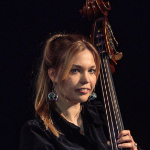The Art of Melancholy
27. November 2023
#1to1dialogues
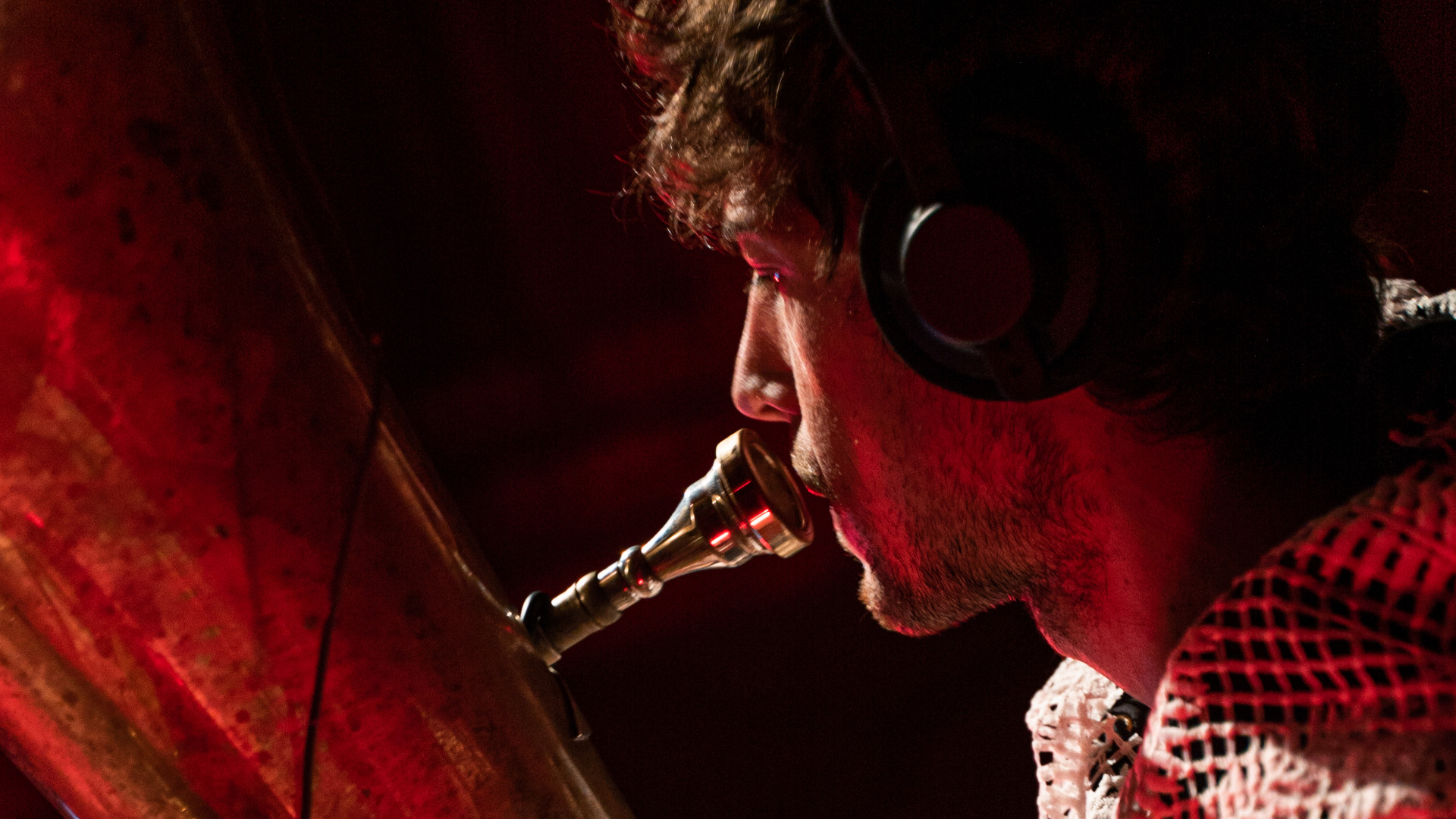 © Matteo Pablo Varisco
© Matteo Pablo Varisco
We are pleased to present the second part of our new Insta live series 1:1 DIALOGUES - this time on the theme of melancholy - very much “in tune” with the season. From October to March, our artistic directors Franziska Ritter and Christian Siegmund will converse with exciting and surprising interlocutors to provide you with small light impulses for the somewhat darker time of the year. They will talk about topics that revolve around the 1:1 CONCERT cosmos: resonance, eye level, social impact and everything that moves our hearts at this time. The dialogues shall be short and inspiring, roughly 15 minutes long - much like a 1:1 CONCERT encounter itself. The name of our interlocutors will remain a surprise until the very end. Here you can find the first episode on the topic of "improvisation" with Franziska Ritter and Maria Reich.
In this new episode, Christian is talking with tuba player and jack-of-all-trades Jonas Urbat. The two know each other through the network of “Kultur- und Kreativpilot:innen”. As a musician, Jonas works with different ensembles and orchestras, as well as solo with tuba and electronics. Moreover, Jonas is a sought-after composer, concept developer, founding member of the STEGREIF.orchester, improviser, producer and creator of a wide variety of soundscapes. With his company SoundWERK PRODUCTIONS, he explores the soundscapes of everyday places visiting factories, workshops and other places to condense the inherent sounds into compositions and then transforms them into veritable musical business cards. This year, Jonas was honoured with the German Business Film Award for his touching video clip about an instrument factory.
Here you can watch the Insta-Live (sorry, German only) and below you find the English extended transcript.
Not entirely melancholic, Jonas’ and Christian’s 1:1 DIALOGUE
Christian: Dear Jonas, welcome to our second Insta-Live Talk. I'm delighted to be talking to you today about the topic of "melancholy". Are you feeling melancholic tonight?
Jonas: A little bit, yeah..
Christian: The last time we saw each other was not digitally, but analogue and live. On 12th November, we worked together with the artist collective 1781 Collective on the topic of "MELANCHOLIA" during the “Labyrinth“ performance. Franziska and I "seduced" 20 people from the audience to a 1:1 CONCERT with you. When the listeners sat down on the empty chair opposite you, was there a sense of melancholy between you? How would you describe these very special 1:1 SEDUCTIONS at the Musikbrauerei?
Jonas: It just occurred to me that I often experience melancholy in a rather individual way, i.e. when I'm alone and entirely on my own, with no one else around. And I think a 1:1 CONCERT is one of the very few situations in which I share this melancholy with another person, and perhaps also create it with my music. Moreover, with a person I don't even know! I find it very special that there is such a space in which melancholy can be actually shared.
Christian: And how does that work? In one of your sound videos, you say that: "music helps to embrace the unknown". That fits quite well, doesn’t it?
Jonas: Yes, definitely. Maybe melancholy has to do with the unknown, so definitely with longing and desire. Music helps you to linger in these spaces. It also makes it easier to endure this mood without the reflex of having to escape or be distracted.
Christian: ...but to go all the way in and connect with it?
Jonas: Exactly, and perhaps to experience a feeling like melancholy is "right" at that moment. Music is very much capable of creating this kind of setting: that's the mood right now and that's perfectly okay. Dark or sad, for example, or melancholic or one of these emotions that are perhaps not exactly connoted as positive or desirable.
Christian: At our performance the other day, we brought individual audience members to you, i.e. we seduced them and then picked them up again and accompanied them. I'm sure many of them left with a feeling of melancholy. After 1:1 CONCERTS there are often many tears, and that evening was no different. You really get completely involved with a stranger by looking so deeply into their eyes. That's unusual and perhaps precisely because it happens so rarely, something opens up inside you. So suddenly with that mutual gaze you share and allow a melancholy that you usually rather experience alone.
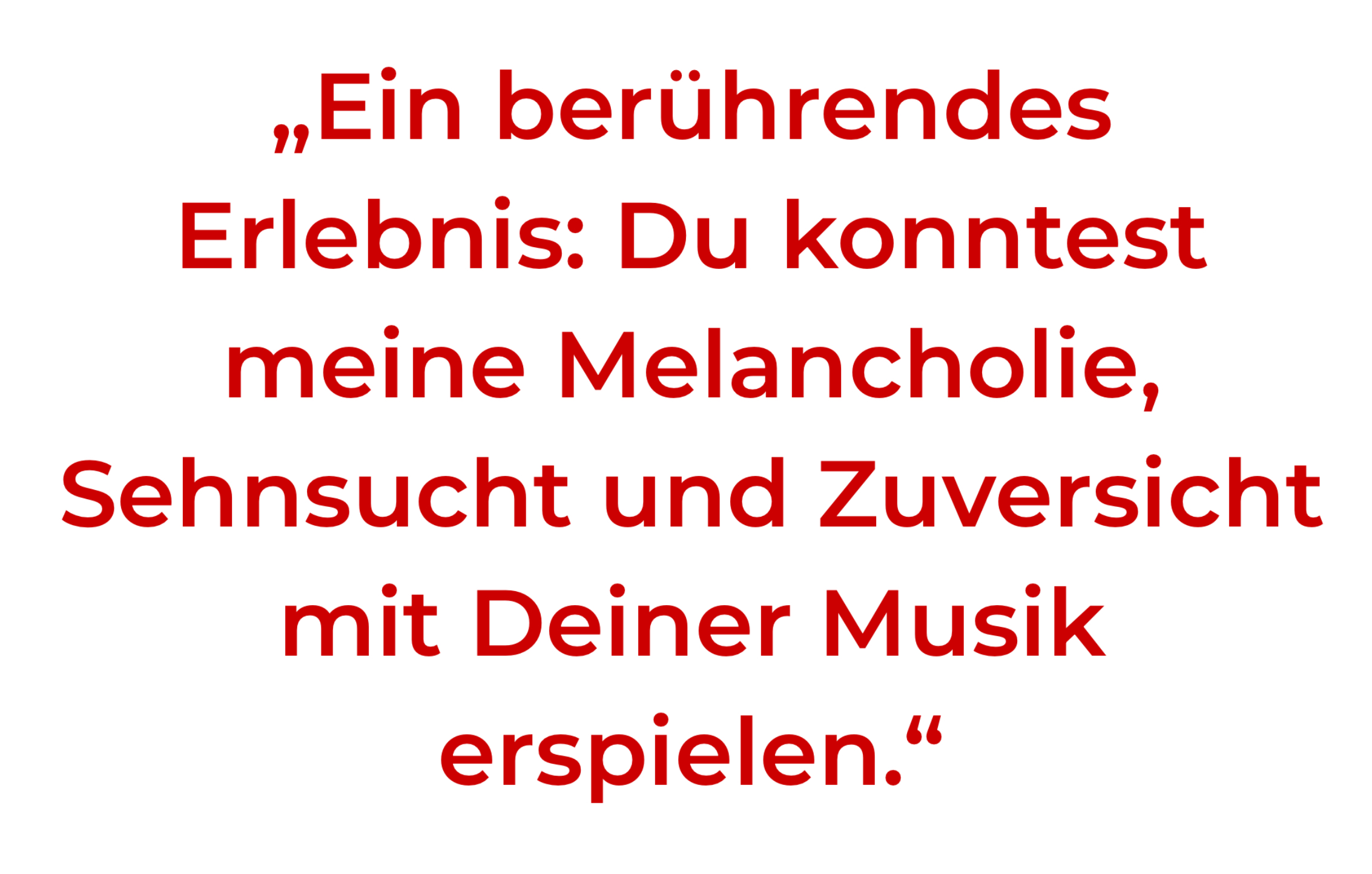
Melancholie: oft ein Thema in den vielen emotionalen Feedbacks der Hörer:innen nach einem 1:1 CONCERT.
Jonas: Yes, but I don't know the format without this particular eye contact at the beginning. I've also asked myself what this mutual gaze is all about. I mean, it's simply an eye contact in itself, without any particular attribution, meaning or function. In any case, this element of the format does a lot, but I couldn't put my finger on it.
Christian: Over the centuries and epochs - from the Middle Ages to modern times and the present - melancholy has sometimes been demonised and sometimes even praised as the most divine thing. Melancholy is difficult to grasp. The more one searches for a definition, the further one moves away from it. The author Mariela Sartorius who has written a book about melancholy ("Die hohe Kunst der Melancholie"), says at one point that all these attempted definitions have one thing in common: the openness towards the unknown. This is precisely what I feel is at the heart of the 1:1 CONCERTS: this opening up or not-closing-up. Open your eyes and open your heart - adn embrace the unknown.
Jonas: For me, melancholy also has something to do with feeling lost, on many different levels. It can somehow be a social feeling of being lost, something like loneliness, or a feeling of being lost in the world when you don't know where you're going or where you stand. For instance when it comes to decisions or intermediate phases in life. But there are also moments when this feeling of being lost is so acceptable or when it is simply allowed to be there, the unknown or being lost.
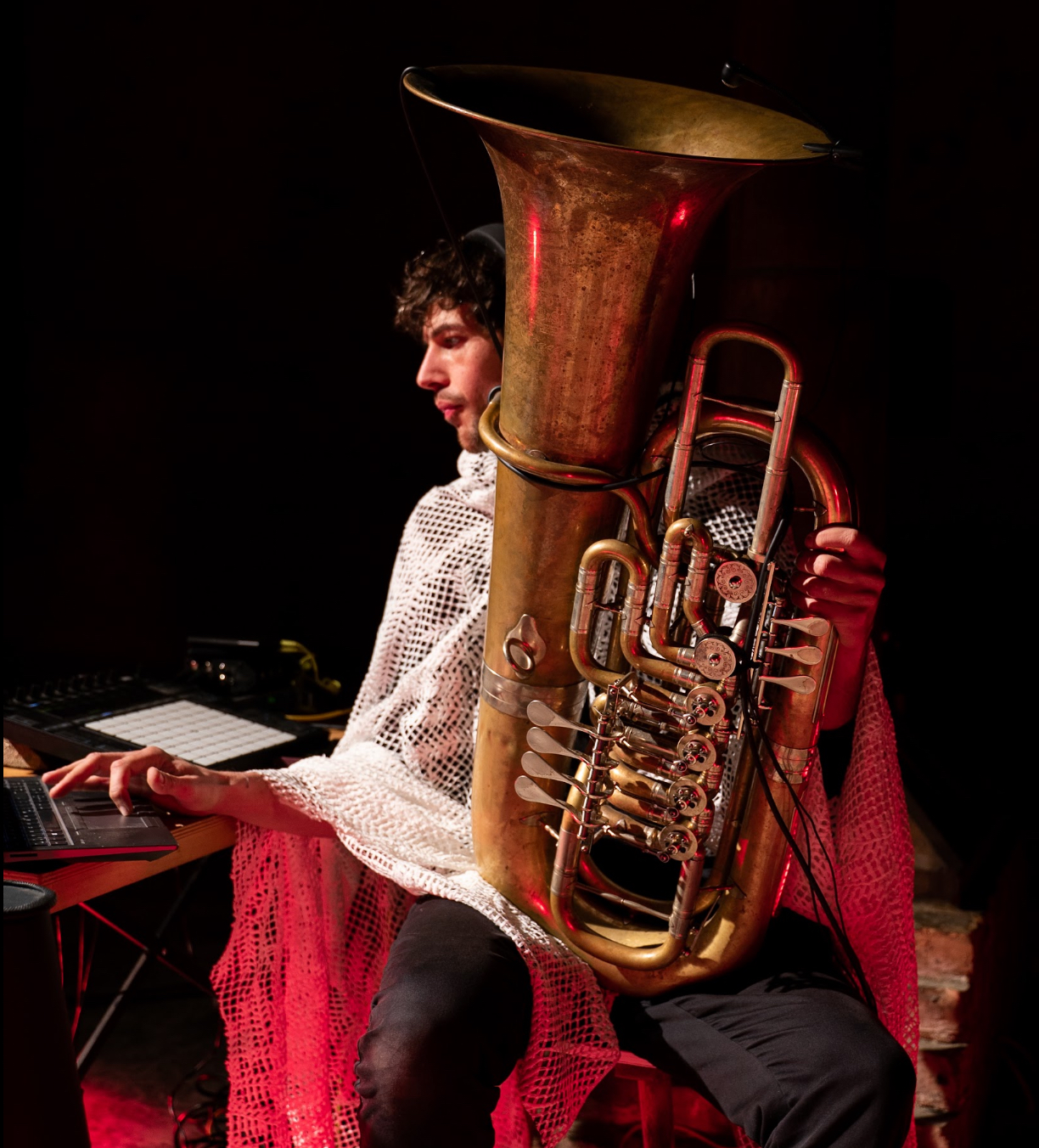
Jonas zwischen Tuba, Elektronik und Melancholie
Christian: What you describe is actually quite beautiful and positive. But it is often interpreted in a sad, somewhat difficult way. The German DUDEN dictionary describes depression as a form of melancholy:
Melancholy: a state of mind characterised by great dejection, sadness or depressiveness
I don't feel that way at all, I think the two are completely different. Depression doesn't create a resonance with the world, it rather breaks it. Melancholy, on the other hand, actually always expands, it opens up and in a sense moves towards the unknown.
Jonas: That definitely resonates with me and I was just thinking why the "official definition" - if we accept the Duden as the officially valid German source for that - differs from what at least we both feel, namely that melancholy is not the path to depression, not per se. And perhaps it has something to do with the fact that we both spend so much time with art and make art, perceive art and think about it, or also share art - in the form of music or other forms. Perhaps this leads to a kind of reinterpretation and the melancholy simply opens up a different space. About ten years ago, I had a moment of a certain intermediate phase. I felt somehow lost and one day I was looking across the river Neckar in Stuttgart's industrial area - which is somehow a break in itself (laughs). And then I noticed the lights reflected on the surface of the water. I felt very melancholic and realised that it was a mixture of sadness and almost joy at the same time. In any case, I find our definition tonight very interesting, i.e. "a sadness that has positive connotations".
Christian: That sounds almost like an epiphany, actually like a Zen moment. Very much unlike depression where you lack a full connection with the world. The sociologist Hartmut Rosa e.g. talks about resonance axes and mentions this "vibrating wire that connects you to the world" in such moments of resonance. It's lovely to see during our conversation how important or even healing melancholy can be.
.jpeg) © Matthias Ziegler
© Matthias Ziegler
Jonas: Well, I think the healing element in it is the coherence with these dark feelings within yourself. That you say: yes, that's exactly what this moment is doing to me, in the situation I'm in right now, what I feel, what I see, how I feel about it, what I know, what I don't know. And to be able to accept the unknown. Yes, that's perhaps how I would try to summarise it: melancholy is a kind of coherence with the darkness within me.
Christian: Did you know that there is a scientific study conducted by the FU Berlin in 2014, the results of which are quite remarkable: it says that if you are sad or melancholic and listen to music that reflects this, you don't become more melancholic and sad, yet on the contrary, you regulate your emotional state like in a kind of therapy. Ultimately, this means that if exactly go where the pain is, you can heal it...
Jonas: ... by even confirming it in a way...
Christian: ... and then dissolving it by putting a burning glass on it. What was it like at our joint performance in November, at the Labyrinth? There you played your piece "Journey" for the various listeners. Was melancholy also a touch of colour on the palette of this "journey"?
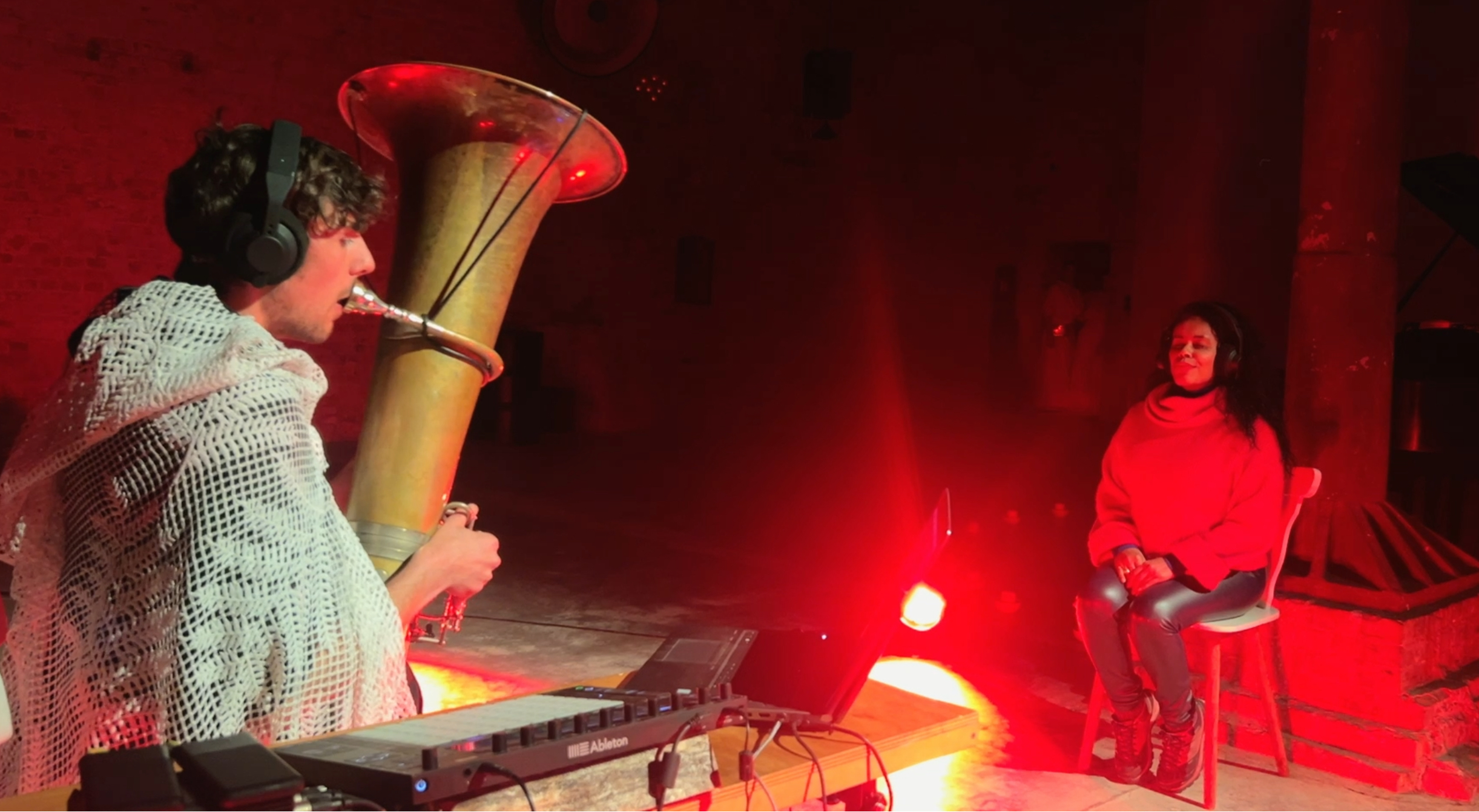
Jonas spielt sein Stück „Reise“ im Labyrinth Melancholia.
Jonas: Yes, definitely. Incidentally, the title of the piece "Journey" only came about through 1:1 CONCERTS. Before that, it simply had a working title. But it's a piece that keeps developing and changing. I can't say for sure whether it ends in melancholy or whether that could also be an idyll. Maybe in every 1:1 encounter it ends differently. But in such peace and harmony, and I think that can have very different colourings.
Christian: In “Reise” you not only play the tuba but you you also work with loops and electronics. Does this final mood also have something to do with the fact that the tuba is such a “low pitched” instrument that one would perhaps attribute more to melancholy than perhaps the piccolo flute?
Jonas: Yes, I can well imagine that. Once you get used to it, the sound of the tuba is very powerful, which is always a challenge. I do have the feeling that I'm simply painting with a huge, fat brush - but of course there's still the need to be able to express something like melancholy or subtle feelings. And yes, perhaps the sound of the tuba is somehow rather warm and round and perhaps earthy. So perhaps you can somehow dive more into it. That's also what melancholy is all about, that you can lie in it and maybe even wallow in it a little - which brings us back to the music you can listen to.
Christian: Jonas, what's the next step for your music projects? We might be able to experience 1:1 CONCERTS with you again next year, at least I hope so. Wherever it is, we will definitely let our community know. How is your musical year coming to an end? Is there any chance of hearing you on stage again?
Jonas: There are no more gigs planned at the moment, but what's really on my mind these days is fully arriving in the Last spring I moved out of Berlin and I'm currently building my own space there. There's a farm and an old chicken shed and it's currently being converted into a studio. This space offers the opportunity to sort out a lot of things that have been created in rather turbulent and complex times and to bring them into a certain form. I'm currently checking out what can become of all that. Texts are being sorted and so on. I am planning to report a bit about the process again, both the building process and the artistic processes, via my newsletter or more personally, like on Instagram.
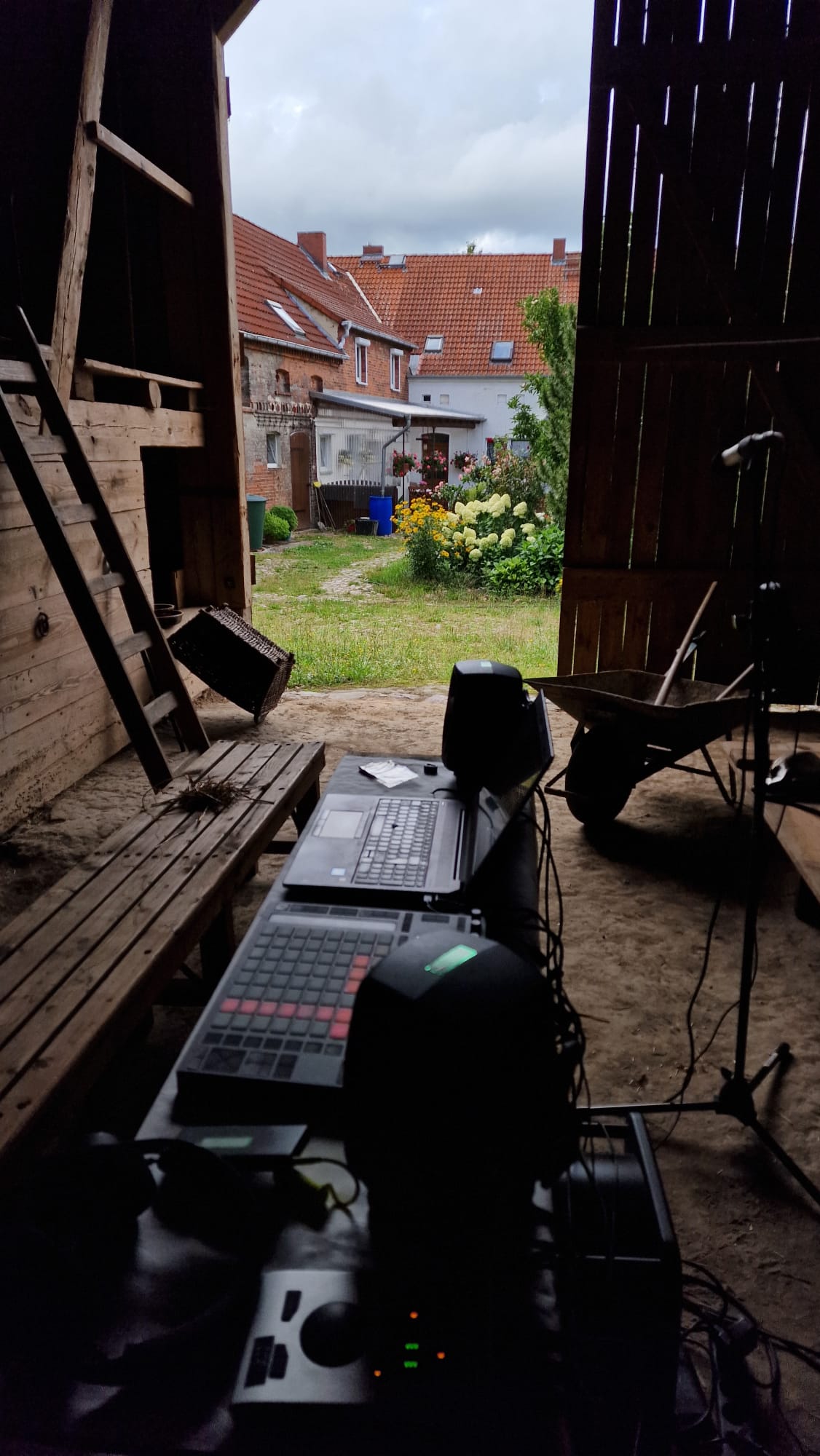
Sortieren und In-Form-Bringen: Studio im Brandenburger Hühnerstall.
Christian: Absolutely! And there’s a lot more information, lots of great videos, audios and very beautiful texts and impressions of your multifaceted work. Hopefully we'll see you at 1:1 again very soon.
Jonas: I'm looking forward to it. 1:1 CONCERTS is a very, very, very great format that I've really taken to my heart.
Christian: Yes, and it is lovely to have you in our 1:1 FAMILY! Thank you for this extremely beautiful conversation about the elusive topic of melancholy. It seems to me that we have created a new definition of it and I look forward to working in many more projects with you. I hope you all have a wonderful evening of fine contemplation.
Jonas: Thank you very much, wonderful!
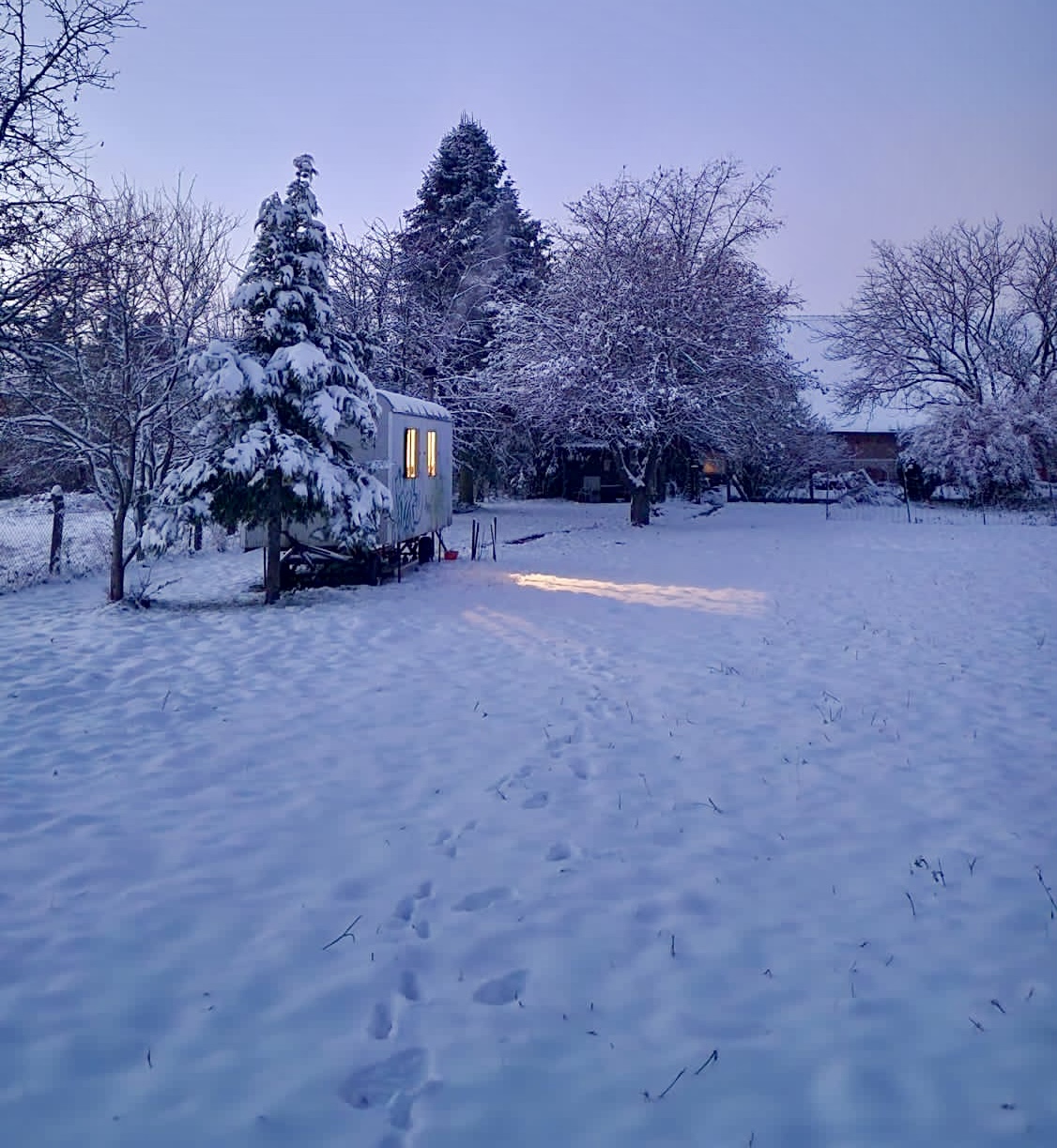
Wintermelancholie aus Jonas neuer Wahlheimat.
